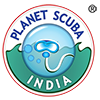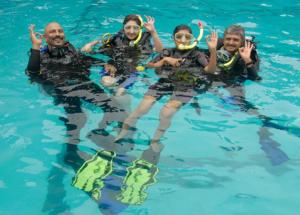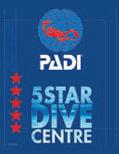Scuba diving has always been associated with deep blue seas, glorious coral reefs, breathtaking underwater sceneries and psychologically, a momentary escape from the drudgeries of life above water. Not everyone can don the wet suit and take a dive in the open waters for the first time, though. It takes a lot of practice to be able to do this, apart from the required certifications. Perhaps the best way to start training for the big dive is inside a swimming pool, where the environment is controlled and there are no surprises for the novice divers.
PADI (Professional Association of Diving Instructors) strongly recommends dive schools around the world to train students in contained waters before taking them out to open waters. One of the main reasons for this would be to combat the initial hesitation and apprehension of students about to dive for the very first time. Apart from the fact that training in a swimming pool is safer it is also easier for instructors to maintain control over the students’ equipment as well as their own.
There is also the psychological aspect of diving to consider. People’s paranoia about sharks and other undersea creatures, fueled by Hollywood, does play an important role in the speed at which a student learns the nuances of breathing and staying calm underwater.
Controlling the rate of descent and staying stable at the desired depth are two other important aspects that can be addressed in contained water dives. There are no extraneous waves and sudden currents that would affect the balance of the diver, and this makes life that much easier for the instructor in training the student.
“It’s all a matter of what’s best for the students,” says Mr. Madhava Reddy, director of Planet Scuba India, which recently launched the country’s first inland scuba divind school in Bangalore. “Our PADI 5-star swim center complimented by the dive center at the KC Reddy Swim Centre and the expertise of out trainers makes our diving school one of the safest. Contained water dives are the best way and of course, the safest way for someone to learn diving and to build the required confidence to dive in open waters,” he added.
PADI Open Water Course
If you’ve always wondered what lies beneath the surface, now’s the time to find out. Start the journey of a lifetime with the PADI Open Water Diver course. It will change you forever.
In the PADI Open Water Diver course, your PADI Instructor takes you through the basics of learning how to scuba dive. You start in a pool or pool-like conditions and progress to the open water (ocean, lake, quarry, etc.) getting the background knowledge along the way.
Earning your PADI Open Water Diver certification is just the beginning. As a certified diver, fabulous dive destinations, exciting people, unparalleled adventure and uncommon tranquility await you. And, as you continue your adventure and gain experience through higher training levels, your opportunities expand.
Becoming a diver opens a door to a whole new world. Open yours and step through.
You will also earn a PADI Open Water Diver certification that is recognized worldwide. As a certified PADI Open Water Diver, you have the freedom to dive independent of a professional. You earn this rating by completing five pool and knowledge development modules and by making four open water (ocean or lake) dives.
Virtually anyone who is in good health, reasonably fit and comfortable in the water can earn a PADI Open Water Diver certification. At some point in the course, your PADI Instructor will ask you to demonstrate the ability to swim 200 meters/yards without swim aids or 300 meters/yards with mask, fins and snorkel and complete a bit of paperwork, to get you on your way.


